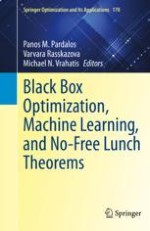2021 | OriginalPaper | Buchkapitel
The No Free Lunch Theorem: What Are its Main Implications for the Optimization Practice?
verfasst von : Loris Serafino
Erschienen in: Black Box Optimization, Machine Learning, and No-Free Lunch Theorems
Aktivieren Sie unsere intelligente Suche, um passende Fachinhalte oder Patente zu finden.
Wählen Sie Textabschnitte aus um mit Künstlicher Intelligenz passenden Patente zu finden. powered by
Markieren Sie Textabschnitte, um KI-gestützt weitere passende Inhalte zu finden. powered by
